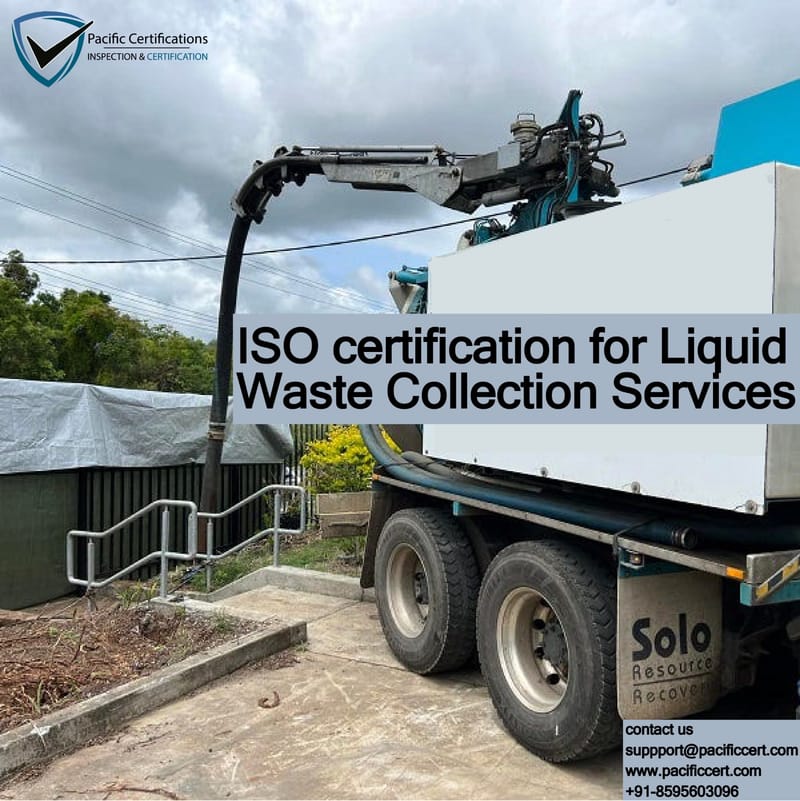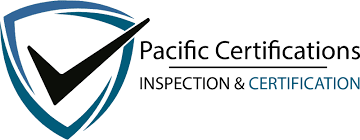ISO Certifications for Liquid Waste Collection Services, Requirements and Benefits

Introduction
Liquid waste collection service providers operate in a highly regulated and risk-intensive environment where public health protection, environmental compliance, worker safety, and service reliability are critical. These services include collection and transport of sewage, septage, industrial effluents, oily waste, chemical liquids, leachate, grease trap waste, and other liquid by-products from residential, commercial, industrial, and municipal sources.
Organizations providing liquid waste collection manage specialized tanker fleets, hazardous materials, confined space operations, spill risks, regulatory reporting, and time-critical service schedules. Any failure in containment, handling, or documentation can lead to environmental contamination, legal penalties, and reputational damage. ISO certifications have therefore become an essential framework for liquid waste collection services to demonstrate structured operational governance, environmental control, safety management, asset reliability, and regulatory readiness.
In liquid waste collection, control, containment, and compliance define responsible service.
Quick Summary
ISO certifications provide liquid waste collection service providers with internationally recognized frameworks to manage service quality through ISO 9001, environmental protection through ISO 14001, occupational health and safety through ISO 45001, sanitation and public utility governance through ISO 24511, asset and fleet management through ISO 55001, risk governance through ISO 31000, information security through ISO/IEC 27001, and service continuity through ISO 22301. These certifications help operators reduce environmental risk, improve service reliability, meet regulatory obligations, and build confidence with municipalities and regulators.
For more information on how we can assist your liquid waste collection organization with ISO certifications, please contact us at [email protected].
Applicable ISO Standards for Liquid Waste Collection Services
Below are the most relevant ISO standards applicable to liquid waste collection service providers:
ISO 24511:2007 – Wastewater and Sanitation Services
ISO 24511 provides guidance on service quality, performance indicators, customer communication, and governance for wastewater and sanitation-related services. For liquid waste collection providers, it supports alignment with municipal service expectations and regulatory frameworks.
ISO 14001: Environmental Management System (EMS)
ISO 14001 is foundational for liquid waste collection operations, enabling structured control of environmental risks such as leaks, spills, emissions, and improper discharge, while supporting compliance with environmental permits and regulations.
ISO 45001: Occupational Health and Safety Management Systems
Liquid waste collection involves confined spaces, hazardous substances, traffic exposure, and manual handling risks. ISO 45001 provides a systematic approach to identifying hazards, implementing controls, and protecting workers.
ISO 55001:2024 – Asset Management Systems
ISO 55001 supports lifecycle management of vacuum tankers, pumps, hoses, valves, and containment systems, improving reliability, maintenance planning, and operational uptime.
ISO 31000:2018 – Risk Management
ISO 31000 enables structured identification and mitigation of operational, environmental, and regulatory risks associated with liquid waste transport and handling.
Click here to find out more applicable standards to your industry
What are the Requirements of ISO Certifications for Liquid Waste Collection Services?
Liquid waste collection service providers seeking ISO certification must establish and maintain documented policies, procedures, and records aligned with the selected ISO standards. Key requirements include the following:
ISO 9001:2015 – Quality Management Systems
Establish a documented quality management system
Define collection, transport, and disposal coordination processes
Control service scheduling, documentation, and reporting
Monitor service performance and corrective actions
ISO 14001:2015 – Environmental Management Systems
Identify environmental aspects such as spills and discharges
Establish controls and emergency response measures
Monitor compliance and environmental performance
ISO 45001:2018 – Occupational Health and Safety
Identify hazards related to confined spaces and hazardous liquids
Implement safety procedures and training
Monitor incidents and corrective actions
ISO 55001:2014 – Asset Management Systems
Identify critical fleet and pumping equipment
Plan preventive maintenance and inspections
Manage risks related to equipment failure
ISO 22301:2019 – Business Continuity Management
Identify critical liquid waste collection services
Develop contingency plans for fleet or route disruptions
Tip:Start by mapping your liquid waste collection lifecycle—from waste pickup and containment to transport, discharge coordination, equipment cleaning, and documentation—against ISO requirements to identify safety and environmental gaps early.
For further information on how we can assist your liquid waste collection services with ISO certifications, contact us at [email protected].
What are the Benefits of ISO Certifications for Liquid Waste Collection Services?
ISO certifications are suitable for septic tank services, industrial effluent collectors, grease trap service providers, oily waste transporters, and municipal liquid waste contractors. Key benefits include:
Improved environmental protection and spill control, reducing contamination risks.
Stronger worker safety and hazard management, lowering injury and exposure incidents.
More reliable and consistent service delivery, supporting municipal and industrial contracts.
Improved fleet and equipment reliability, reducing breakdowns and service delays.
Enhanced regulatory compliance and audit readiness, supporting permits and renewals.
Greater operational resilience, ensuring continuity during disruptions or emergencies.
Liquid waste collection services are under increasing scrutiny as environmental regulations tighten and urbanization accelerates. Industry assessments show that wastewater and septage volumes are growing by 3–4% annually in many regions, driven by population growth and industrial expansion. At the same time, regulators are intensifying oversight of transport, containment, and disposal practices, with environmental agencies reporting that transport-related spills and documentation gaps remain among the most common compliance findings.
Operational benchmarking indicates that liquid waste collection providers implementing structured quality, safety, and asset management systems achieve 15–25% reductions in spill incidents, vehicle downtime, and regulatory non-conformities compared to operators relying on informal controls. Looking toward 2030, ISO-aligned governance is expected to become a baseline requirement for medium-to-large liquid waste collection contractors, as municipalities and industries increasingly favor certified providers demonstrating accountability, safety, and environmental responsibility.
How Pacific Certifications Can Help
Pacific Certifications, accredited by ABIS, acts as an independent certification body for liquid waste collection service providers by conducting impartial audits against applicable ISO standards. Our role is to objectively assess whether documented management systems and operational practices conform to international ISO requirements, based strictly on verifiable evidence and records.
We support liquid waste collection organizations through:
Independent certification audits conducted in accordance with ISO/IEC 17021
Practical assessment of real collection operations, fleet controls, and safety systems
Clear audit reporting reflecting conformity status and certification decisions
Internationally recognized ISO certification upon successful compliance
Surveillance and recertification audits to maintain certification validity
If you need support with ISO certification for your liquid waste collection services, contact us at [email protected] or +91-8595603096.
Ready to get ISO certified?
Contact Pacific Certifications to begin your certification journey today!
Suggested Certifications –
Read more: Pacific Blogs

